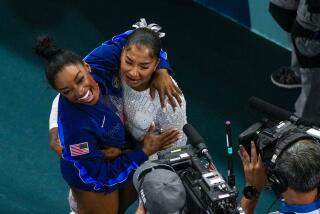Olympic Hopes Brighten for U.S. Gymnastic Teams
- Share via
HOUSTON — If the back-biting and petty politicking of the women’s private coaches don’t get in the way, United States gymnasts should be strong contenders for some 1988 Olympic medals after all.
“On paper, the Soviet Union and Romania have got first and second locked up, though it’s an athletic contest and that means anything can happen,” says Don Peters, coach of the U.S. women’s Olympic team. “But I think we’re as good as anybody else for third.”
Similarly, men’s coach Abie Grossfeld feels his division will be dominated by the Soviets and Chinese, but he too believes his team has a legitimate shot at the bronze.
“I’ve seen videos of the Japanese compulsories, and we’re certainly comparable to their level,” Grossfeld says. “My feeling is that with the level we’re at in optionals, we can compete with them for bronze. The East Germans and Romanians and Bulgarians, the Japanese and the Hungarians--those will be our main competition, and I feel we can hold our own. It’s a matter of hitting (the routines) and getting the scorers.”
One sour note was the political infighting among the women’s coaches, which prompted Romanian defector Bela Karolyi to quit as the head of the Olympic gymnastics delegation. The mentor of Olympic champions Nadia Comaneci and Mary Lou Retton also coaches new U.S. champion Phoebe Mills of Northfield, Ill., and four other Olympic team prospects. If he does not change his mind, Karolyi’s absence could adversely affect his proteges’ performance in Seoul.
“I don’t want to think about it,” Mills said of the possibility of her coach staying nome. “I’m sure everything will work out.”
Granted, bronze medals would be a comedown from the 1984 Olympics at Los Angeles where United States gymnasts won the men’s gold, women’s silver and 12 individual medals. But that unprecedented American success was due in large part to the boycott by the gymnastically-strong Eastern bloc nations. This year, Cuba has the only good gymnastics team likely to be kept out of Seoul by politics.
Even bronze medals appeared out of reach last October, when the injury-riddled U.S. men’s team finished ninth and the inexperienced women’s team placed sixth at the 1987 world championships in Rotterdam, Netherlands.
Those were the same placings the squads earned at the Montreal world championships in 1985, the first year of the rebuilding program prompted by the retirements of all the 1984 Olympic stars except Tim Daggett and Scott Johnson.
The picture failed to brighten much during the winter and spring, despite Daggett’s progress in his comeback from the near-crippling leg fracture he suffered in Rotterdam.
Just as Daggett was beginning to attempt his first moves in floor exercise, Johnson, the 1987 U.S. men’s champion, broke his hand and underwent surgery. Kristie Phillips, the women’s champion, gained a large amount of weight, switched gyms a couple times, then went on a crash diet. Finally, the men’s team drew into the opening round of the Olympic team competition, in which the scoring is usually strictest and most conservative.
Coaches and the gymnasts kept saying the United States still had a chance for medals at Seoul but the words were mere lip service.
The U.S. championships at The Summit in Houston last week changed all that.
The competition, won by Dan Hayden of Amherst, N.Y., and Phoebe Mills was so skilled and spirited that even the most negative observers came away optimistic once again.
“I certainly am more optimistic,” Grossfeld said after nationals. “I was very satisfied with what I saw, and I felt it was quite a bit of improvement--especially in compulsories. That, in a sense, is far more important than optionals because it decides our seedings for finals.
“I’m more optimistic because the guys looked in good condition and improved in compulsories. I think even without Tim and Scott, I feel optimistic. If they make the team, it’ll only enhance our chances more because they’re among our top gymnasts for sure.”
Besides Johnson and Daggett, other leading candidates for the team include Hayden, national runner-up Kevin Davis, third-place Charles Lakes, Tom Schlesinger and Curtis Holdsworth.
The women’s competition was even tighter and better balanced than the men’s.
Only 1.64 of a possible 80 points separated champion Mills from 11th-place Melissa Marlowe of Salt Lake City.
“I think we’re going to be deeper and better balanced than in ‘84,” Peters said. “I think we’re going to be pretty deep. If you look back over the competitions during the last year, a different girl has won every meet. In ‘84, the 18 months before Olympics, Mary Lou (Retton) won every meet she was in. You had a clear-cut champion. This year, we’ve had a lot of different kids winning. I think that’s going to be in our favor . . .
“If you look at the men in ‘84, the bottom of the team made the difference. The top three Americans and top three Chinese were about the same, but our bottom three were better. That’s where we won the meet, and from the national championships, I don’t think you could even pick the favorites to make the team, other than Phoebe Mills. It’s real close in there.”
More to Read
Go beyond the scoreboard
Get the latest on L.A.'s teams in the daily Sports Report newsletter.
You may occasionally receive promotional content from the Los Angeles Times.






